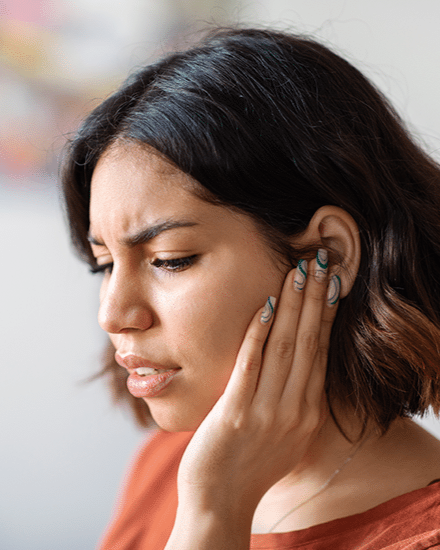
SUPPORT STARTS HERE
SPECIALTY ASSESSMENTS
Hearing in Noise Evaluation
Hearing isn’t just about your ears— it’s also about how your brain makes sense of sound. These tests give us a deeper look at how your auditory system is working as a whole.
Tinnitus Evaluation
The experience of tinnitus is common, but each person’s experience can vary greatly. Specialty tinnitus testing gives us the details we need to help you get targeted and effective relief.
Hyperacusis & Misophonia Evaluation
Do you experience sensitivity to loud or specific sounds? Getting an evaluation is sure to provide us with the data wee need to help you best.
When someone tells us that they struggle to hear when there is background noise, we are sure to do a specialty assessment that goes beyond the basics. Understanding communication isn’t just about your ears, it’s how you process these sounds into meaning. This is especially true in more complex environments like busy restaurants, meetings, or group conversations where multiple voices and background noise are in play.
HEARING IN NOISE EVALUATION
WHAT IS A HEARING IN NOISE TEST?
This test helps us understand how well you hear and understand when there’s background noise. This kind of listening takes extra coordination between your ears and your brain.
Most people find this test challenging, even if their hearing test looks “normal”. This test pinpoints where your brain starts to need more support in background noise. The insights we gain from this test help us shape better strategies and technologies to meet your real-world needs— so listening feels more natural, and less like work.
WHY DOES IT MATTER?
WHAT HAPPENS DURING A HEARING IN NOISE TEST?
You’ll listen to some silly sentences said by a woman with increasing background noise. Your job will be to pull out what the woman says as best you can as the background noise becomes louder.
In another test, you will listen for a specific sound like a siren through static noise. You will let us know when you just start to hear that target sound.
If you’re hearing ringing, buzzing, hissing, or other sounds in your ears or head that aren’t coming from the outside world, you’re not alone. This is often called tinnitus, and it’s a very common experience. A comprehensive tinnitus evaluation helps us understand what you’re hearing, how it affects you, and how your ears are functioning overall — so we can guide you toward relief and support.
TINNITUS EVALUATION
WHAT IS A TINNITUS EVALUATION
A tinnitus evaluation is more than just a hearing test. It’s a detailed look at your hearing system and your unique tinnitus experience. Many people with tinnitus also have changes in their hearing — sometimes subtle — and this evaluation helps us get the full picture.
Tinnitus is a very real experience, and while there's no one-size-fits-all cure, there are tools, strategies, and treatments that can help. Your evaluation results give us valuable information so we can:
Rule out any medical concerns
Understand how your ears are working and identify the root of your tinnitus
Match you with the most appropriate and effective tools in our holistic tinnitus support program
WHY DOES THIS MATTER?
What Happens During A Tinnitus Evaluation?
The evaluation takes about 60-90 minutes and includes a series of safe, comfortable tests. You don’t need to prepare in any special way— just come as you are.
Click through below for a detailed guide of what to expect during your tinnitus evaluation.

These tests are quick and comfortable — and there are no “right” or “wrong” answers. They simply help us understand your unique sound experience, which is key to creating a personalized plan.
A tinnitus evaluation is the first step toward understanding what’s going on and finding ways to feel more at ease. Whether your tinnitus is new, long-standing, mild, or more intrusive — we’re here to help you make sense of it, and support you moving forward.
If everyday sounds feel too loud, overwhelming, or are emotionally triggering, a hyperacusis evaluation is a safe, supportive way to better understand what’s going on.
HYPERACUSIS & MISOPHONIA EVALUATION
WHAT IS A HYPERACUSIS & MISOPHONIA ASSESSMENT?
We will take testing slow and track where your discomfort begins. With this information we can create a care plan that is tailored for you.
You don’t have to “just deal with it” or push through discomfort. These conditions are real and your experience is valid. Testing is not about pushing limits— it’s about identifying your comfort zone, so we can better understand your unique sound sensitivity, start off on the right foot, and set an appropriate pace toward relieving your symptoms.
WHY DOES IT MATTER?
We will conduct a carefully controlled test that helps us measure your personal sound tolerance. We play a range of tones or speech, gradually increasing the volume. You let us know when a sound starts to feel uncomfortably loud — not painful, just too much for you.
You are in full control: you can stop or pause the test at any time.
WHAT HAPPENS DURING A TEST?






